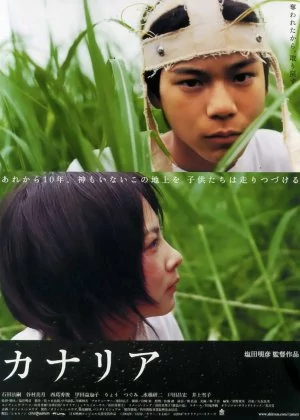Canary

Akihiko Shiota's Canary [Kanaria] is one of those films I saw when I was still getting acquainted with Japanese cinema. It's not one of the very first films I watched, but back then Japanese drama still felt very fresh and different. Shiota isn't the most typical director and Canary is certainly situated on the darker side of the spectrum, still, it fits neatly within the expected boundaries of the genre. Needless to say, I was quite curious to find out how I would experience this film a good 15 years later. Somewhat to my surprise, I may have liked it slightly more the second time around.
![screen capture of Canary [Kanaria]](/thumbs/img/articles/1200xauto/canary-1.webp)
People who like to watch the occasional Japanese drama will find it impossible to ignore Shiota's oeuvre, others may have never even heard of the man before. Shiota belongs roughly into the same category as Kazuyoshi Kumakiri, a director who dares to tackle taboo subjects, isn't afraid to feature complex and somewhat unsympathetic characters and prefers a more challenging drama. Canary truly is a poster child for this type of film, though it probably explains why Canary never found a bigger audience outside of Japan. These films rarely become audience favorites.
Canary is a film about the fallout of the Aum cult (the ones responsible for the sarin gas attacks on the Tokyo metro in '95 - though Shiota uses a different name). Rather than focus too much on the cult and its malicious history, Shiota picks an alternative angle and follows two kids left behind by a member of the organization. One of the kids is taken in by her grandparent, the other is left in the care of child welfare, as he is too brainwashed by the cult's teachings. He is the main character, a kid who is wholly unlikable, possibly dangerous, but through no real fault of his own.
12-year-old Koichi and his little sister joined their mom when she signed up with the cult. Once disbanded, Koichi ends up all alone in the custody of child welfare. He escapes from their clutches and sets out to find his little sister, who lives with their grandfather in Tokyo. On his way there, he inadvertently rescues Yuki from a child molester. Yuki has an abusive father and decides to join Koichi on his trip to Tokyo. The two have no money and are forced to survive in a world that isn't doing them any favors. Koichi in particular has trouble adapting to his life outside the cult.
![screen capture of Canary [Kanaria]](/thumbs/img/articles/1200xauto/canary-2.webp)
The cinematography is appropriate and there are some moments where Shiota flexes his muscles, but it is largely designed to avoid demanding too much attention. The color palette is muted with dulled blues and greens, many of the tracking shots appear off the cuff and the lighting is purely functional. But the occasional shot does betray an exceptional eye for composition and the Japanese countryside makes for a beautiful setting, so the film doesn't look particularly ugly. Shiota seems to have found the right balance here, just don't except to be floored.
The soundtrack aims for a very similar effect. For the most part, the score is pretty typical drama material. Soft, pleasant piano music, the occasional string and comfortable compositions. The music backs the atmosphere and adds some delicate touches left and right, but never really pushes to the forefront. There are a couple of drum-based tracks that are more demanding, but they are used sparingly and still fit within the general mood of the film. Much like the cinematography, the score is mostly supportive rather than leading.
What does stand out are the performances of the two young leads. Hôshi Ishida and Mitsuki Tanimura put in tremendous efforts and give birth to two very young, troublesome but complex and tragic characters. Both their individual performances and the chemistry between them are exceptional, especially for actors this young. Appearances by Hidetoshi Nishijima, Miyako Koda and Noriko Eguchi add to the appeal and keep the quality high, also in the secondary cast. Canary is one of the few films where I feel the cast really had a big impact on the overall quality.
![screen capture of Canary [Kanaria]](/thumbs/img/articles/1200xauto/canary-3.webp)
Pure realism isn't Shiota's main priority here. You'd be right to ponder how two 12-year-old kids would survive on a penniless trip to Tokyo, or whether the adversities they face aren't a bit exaggerated, but the plot is merely an excuse for putting these two characters in various situations where they can play off of each other. There are a couple of flashbacks that provide extra context to Koichi's history and a small diversion as he meets up with some of his former cult associates, but the crux of the matter is the unique relationship between these two kids.
Canary may not be topping too many lists, nor does it have a strong, dedicated fan base. That has more to do with its relative obscurity and tough, almost impenetrable exterior than factual lack of quality. Shiota proves himself a gifted drama director and balances cinematography, score and performances to draw the most out of the conflict between the two leads. Canary may not be a very flashy or exuberant, it's a superb drama that doesn't flinch when it's dealing with unpleasant characters and darker, often taboo themes. Well worth watching if you're starved for good Japanese dramas.